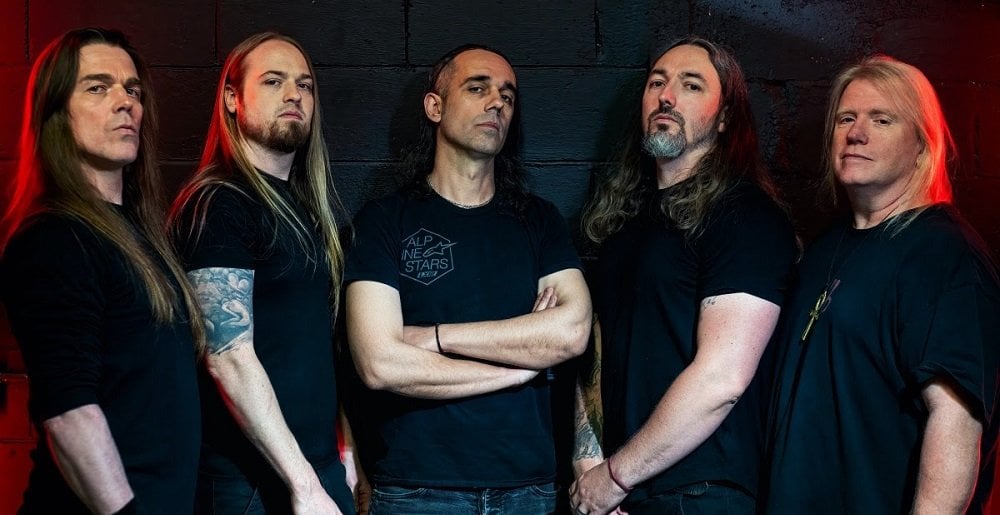by BRIAN GIFFIN
FOR thirty years, the ancient legends and mythologies of Egypt and Mesopotamia have provided the creative fuel for South Carolina metal veterans Nile. On their tenth album, the band once again rolls back the stone from the tomb to explore darkened catacombs, lost rituals and arcane texts to the soundtrack of brutal and precise death metal technicality.
The Underworld Awaits Us All is the first album Nile has recorded as a five-piece, and with three guitarists: founder Karl Sanders, Zach Jeter and non-touring member Brian Kingsland. Already a band known for histrionic levels of shred, the presence of a third guitar player gave them “choice and options,” according to Sanders.
“There’s no guitar solos that were allowed to stay that didn’t serve a greater purpose. With three guys, who can all play, any one of us could’ve easily done the whole thing and still have guitar shred left. But with three guys we had to make choices, like ‘Does this help the song?’ ‘Is this taking it in a new direction?’ ‘How do these solos work together to tell our musical story?’ So it was fun putting our heads together and trying to do something for the greater good.”
Each guitarist’s divergent style was a further boon to their creative process, making it easier for them to plan what each of them was going to do within a track.
“We tried to use that to decide what would be advantageous to put who, where,” Sanders explains. “A lot of times I’ll take the place where the song is going to stretch out. Brian is amazing with chord changes, so Brian got all the chord changes and Zach got the melt-your-face-off kinda shreds.”
Along with the three-way guitar attack, The Underworld Awaits Us All continues Nile’s long and proud tradition of elaborate story-telling, mostly based around ancient texts. Source material this time includes the Book of the Dead and the Stele of the Vultures, which lends its name to the album’s opening track, the tale of a victory by a Sumerian king. The Book of the Dead provides the inspiration for the breathtakingly-titled “Chapter for Not Being Hung Upside Down on a Stake in the Underworld and Made to Eat Feces by the Four Apes”.
“I’m never in danger of running out of source material to write Nile songs,” Sanders says, “because there’s thousands of years of Egyptian history. I could go several lifetimes and still not run out of potential Nile songs.”
One instrumental track is a callback to their debut album. “The Pentagrammathion of Nephren-Ka” is derived from a guitar lesson built around a musical scale Sanders developed early in the band’s career.
“The Nephren-Ka scale is a synthetic scale that was constructed during that time period. Some of the riffs used some unconventional collections of notes. To find a way to deal with that, we took those and made it into its own scale, gave it its own name as a defacto synthetic scale. So the pentagrammathion of the Nephren-Ka scale is turning that scale into a five-note scale and replacing that missing note with something else. Necessity is the mother of invention. So if you can’t find the scale you need, write it yourself! Why not?”
When it comes to finding the inspiration for a particular track, the Nile frontman usually starts with a blank slate: “I open a random book and whatever page that happens to be, whatever that’s about, that’s what we’re writing on. So it’s generally not anything in particular. Each of the songs have a different source. It’s quite elaborated upon in the liner notes to the record.”
All Nile albums – except full length debut Amongst the Catacombs of Nephren-Ka and 2007’s Ithyphallic – are accompanied by Sanders’ detailed liner notes explaining the concept of the lyrics. The Underworld Awaits Us All follows tradition.
“I spent a couple of weeks on it. The tricky part of that is that there is often a time gap between when the song gets written and, in the case of this record, a couple of years later when it’s finally time to write the liner notes. So there was a couple of times where I’m scratching my head going, ‘Which book did this come from?’ It took a while to trace down all the sources.”
Much of what we know and understand about ancient Egyptian culture comes from funerary texts and inscriptions about the underworld and afterlife, leading to the modern misconception that people then were fixated with death. But as Sanders points out, that’s because a large percentage of what is left behind was discovered sealed inside tombs where it had been preserved for millenia. Nature and time destroyed most of the rest.
“We understand everything through the lens of our time and experience and what we see on television,” he says. “We understand the Egyptians from what they left behind, and much of that is funerary in nature. If you find it on the inside of somebody’s tomb… it’s like if you go on down to the grocery store and you find groceries there – you’re at the grocery store, pretty much everything’s going to be groceries. But that’s not the sum total of our existence. If you go to the auto parts store, they’ve got auto parts there, and if that’s the only part of the world you ever saw, you’d think the world was a bunch of auto parts. Obviously, it’s not!”
NILE AUSTRALIAN TOUR 2024
15/10: Civic Hotel, Perth
16/10: The Gov, Adelaide
17/10: The Brightside, Brisbane
18/10: Max Watts, Melbourne
19/10: Uni Bar, Hobart
20/10: Crowbar, Sydney













